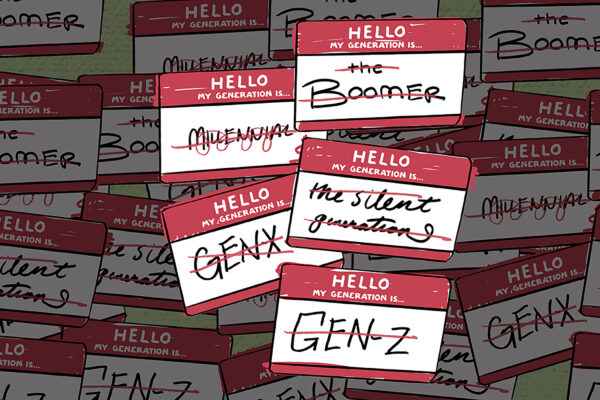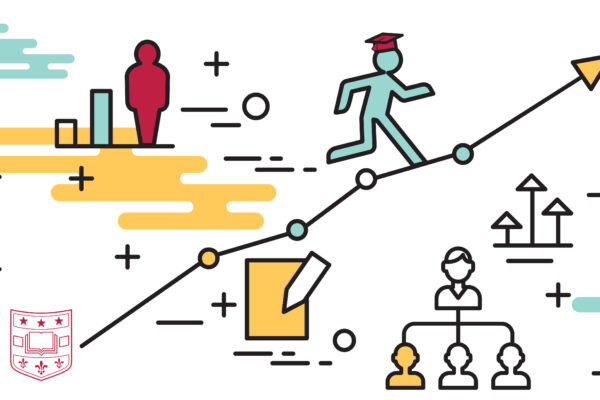As part of its strategic plan “Here and Next,” WashU is mobilizing research, education and patient care to establish the university, and St. Louis, as a global hub for transformative solutions to society’s deepest challenges. The plan’s new Digital Transformation initiative is creating and accelerating those solutions with a collaborative, -tech-based approach.
“Digital technologies are transforming our society in ways we are only beginning to comprehend,” says Philip R.O. Payne, the Janet and Bernard Becker Professor at the School of Medicine and the founding director of the Institute for Informatics, Data Science and Biostatistics, who leads the newly established initiative. “They have the power to save lives, revolutionize industries and store unlimited amounts of information. So much of our work at WashU can be elevated and accelerated by harnessing modern data and computational and communications methods. In response to these opportunities, we’re building a community of WashU faculty, staff and learners to advance digital transformation across all of our missions.”
“WashU Digital Transformation aims to enhance research excellence, strengthen digital learning experiences and enable optimized operations across schools and campuses,” says Beverly Wendland, provost and executive vice chancellor for academic affairs. “The initiative also will position WashU as a leader in addressing technological challenges and opportunities, including using big data to improve public health, combat disinformation and develop trustworthy and human-centric artificial intelligence.”
“WashU Digital Transformation aims to enhance research excellence, strengthen digital learning experiences and enable optimized operations across schools and campuses.”
Beverly Wendland
The initiative’s institutional home, the Digital Intelligence & Innovation (DI2) Accelerator, provides centralization and support to digital efforts across the Danforth and Medical campuses. It also promotes and increases digital activities at WashU via seed funding, special events and interdisciplinary collaborations.
Within the DI2 Accelerator, the Digital Solutions Studio has a full team of data and software engineers to enable WashU faculty and students to better and more quickly leverage their research products for a whole host of uses. It’s already had significant success, including the debut of an innovative St. Louis data visualization platform.
Developed in partnership with Arts & Sciences faculty members and with support from WashU’s Incubator for Transdisciplinary Futures, the St. Louis Data Dashboard lets WashU researchers, community members and area stakeholders easily track and compare datasets in categories including health factors, election results, census information, even Citizens’ Service Bureau calls. The Digital Solutions Studio built the dashboard in just six months, a process that otherwise might have taken years.
“The researchers needed help from software developers to best enable the development of their dashboard,” explains Albert Lai, professor of general medical sciences and chief research information officer at the School of Medicine, and deputy faculty lead for Digital Transformation. “Being able to bring in our Digital Solutions Studio team dramatically accelerated the pace at which the team was able to arrive at a functional dashboard.”
“It was like having a jet rocket all of a sudden, propelling the project forward,” says Andrew Reeves, director of the Weidenbaum Center on the Economy, Government, and Public Policy.
Reeves, a professor of political science in Arts & Sciences, says the new dashboard will let him and his colleagues easily access and analyze large datasets, allowing them to better study regional policy options.
“We are harnessing WashU’s unique resources and expertise to responsibly and ethically address complex problems and advance science, engineering, public health, creative practice and so much more.”
Philip P.O. Payne
“A researcher might have a question about the causal effect of different policing strategies or the relationship between environment and voter turnout,” Reeves says. “Not only can we answer these questions about how to make the region better, how to make lives better for the people who live here … we can answer these really profound public policy questions in a scientific way that aligns with the cutting-edge research that people here at the university are doing.”
The Digital Transformation initiative is extending its reach beyond the university, establishing strategic relationships with key industry partners to further propel interdisciplinary digital transformation efforts at WashU. It’s also working as a convener and catalyst for others operating in the digital space. Last October, for example, the initiative held a two-day AI and Digital Health Summit, bringing in field-leading speakers to address the ways in which AI will transform health-care delivery. The initiative is also scheduled to host the Inside Higher Ed and Times Higher Education Digital Universities conference in May. The event will bring together leading voices from higher education to discuss digital-first access, equity and innovation happening at universities across the country.
“We are harnessing WashU’s unique resources and expertise to responsibly and ethically address complex problems and advance science, engineering, public health, creative practice and so much more,” Payne says.


